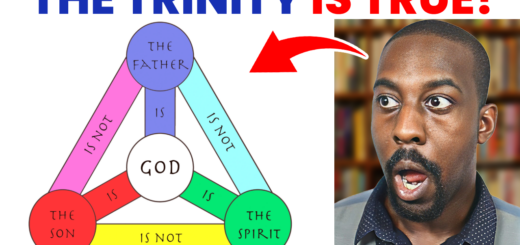Shaykh Uthman Says Jesus Isn’t Equal to God – A Trap That Backfired
In a recent video, popular Muslim apologist Shaykh Uthman Ibn Farooq tried once again to prove that Jesus is not God. But as has happened many times before, the trap he tried to set ended up exposing the flaws in his own argument.
This encounter between him and a Christian preacher serves as a perfect example of what happens when someone with surface-level Bible knowledge meets someone who’s actually studied the Word and knows what it says.
 Setting the Stage: Watch for the Traps
Setting the Stage: Watch for the Traps
Before the conversation even begins, you can already see Shaykh Uthman trying to set a trap. He begins by laying out basic attributes of God—He’s eternal, all-powerful, all-knowing, outside of time and space.
The Christian preacher agrees with these truths. Then Uthman transitions into discussing Jesus becoming human, trying to set the stage for a contradiction.
But here’s where wisdom kicks in: the preacher doesn’t just jump into the trap.
He listens, he clarifies, and he patiently walks Uthman through Scripture—especially Philippians 2, which clearly affirms the deity of Christ.
As soon as they mention Philippians, Uthman shifts tactics and attacks Paul rather than addressing the content. He asks,
“Did Paul even meet Jesus?”
The goal? Undermine the authority of the Scripture before even engaging with what it says.
The Christian preacher immediately recognizes this as a distraction and calls it out. He flips the argument back on Uthman, pointing out that Muhammad himself claimed to receive visions.
If critics discredit Paul’s testimony because he saw Jesus in a vision, they must also question what that implies about Muhammad.
This unexpected response causes visible discomfort for Uthman, and the trap starts unraveling.
 Philippians 2: Jesus Is Equal with God
Philippians 2: Jesus Is Equal with God
Despite the distraction, they eventually return to Philippians 2:
“Let this mind be in you, which was also in Christ Jesus: Who, being in the form of God, thought it not robbery to be equal with God: But made himself of no reputation, and took upon him the form of a servant, and was made in the likeness of men…” —Philippians 2:5–7
This passage clearly teaches that Jesus was in the form of God and considered equality with God not something to cling to—but instead humbled Himself to become human.
The preacher patiently explains that Jesus, being fully God, chose to take on the role of a servant. His equality with God didn’t change, but His position did—for our sake.
Uthman’s response? He brushes it off. No real rebuttal. Just a vague, “Okay, but…” before quickly moving on.
 “Made Lower Than Angels” – A Misunderstood Verse
“Made Lower Than Angels” – A Misunderstood Verse
Uthman then quotes Hebrews 2 and Psalm 8 to claim Jesus can’t be God because He was “made a little lower than the angels.”
“But we see Jesus, who was made a little lower than the angels for the suffering of death…” —Hebrews 2:9
“For thou hast made him a little lower than the angels, and hast crowned him with glory and honour.” —Psalm 8:5
What Uthman conveniently overlooks is the phrase “for the suffering of death.” Jesus humbled Himself in His humanity so that He could suffer and die.
This wasn’t a permanent demotion—it was a purposeful act of love. He took on flesh and lowered Himself for a time to accomplish salvation for humanity.
Even more telling, the Greek wording here (as the preacher rightly notes) allows for the interpretation “for a little while.”
It’s not a statement of Jesus being less than angels by nature—it’s a reflection of His temporary humility for the sake of redemption.
 Jesus Is God, No Matter How Many Times They Deny It
Jesus Is God, No Matter How Many Times They Deny It
When the preacher points out the Greek wording behind “a little lower,” Uthman dismisses it as a forgery. But this is ironic.
Earlier in the conversation, Uthman asked whether the preacher could read Greek—something the preacher humbly admitted he had learned, even if rusty.
Suddenly, when someone uses Greek to clarify a passage, Uthman dismisses it as unreliable.
This shift reveals the shaky foundation behind many of these arguments. They’re not seeking truth—they’re defending a predetermined conclusion.
When someone rightly divides the Word, even the cleverest traps collapse. Share on XThis exchange reveals more than a disagreement—it exposes a pattern. Every time a clear passage affirms Jesus’ divinity, the argument shifts or the source comes under attack. But the truth of God’s Word never wavers.
“In the beginning was the Word, and the Word was with God, and the Word was God.” —John 1:1
“And the Word was made flesh, and dwelt among us…” —John 1:14
The saints didn’t group Jesus among themselves—they pointed to Him. He wasn’t just a man or teacher. Jesus Christ came as the Word made flesh, the Lamb of God, the King of kings, and the Savior of the world.
 Know the Word, Don’t Just Argue
Know the Word, Don’t Just Argue
This isn’t just about winning a debate. It’s a reminder that believers must know the Word—not just read it. These kinds of challenges will keep coming.
People will try to twist Scripture, discredit apostles, and question Jesus’ divinity.
But when you’re grounded in the Word, confident in the truth, and filled with the Spirit, you don’t have to fear any trap. You can speak boldly and lovingly—and the Word will do the heavy lifting.
If you want to check out another instance where Uthman’s tactics were exposed and the truth of Christ stood tall, check out this next article. God bless.
WATCH THE VIDEO
























Recent Comments